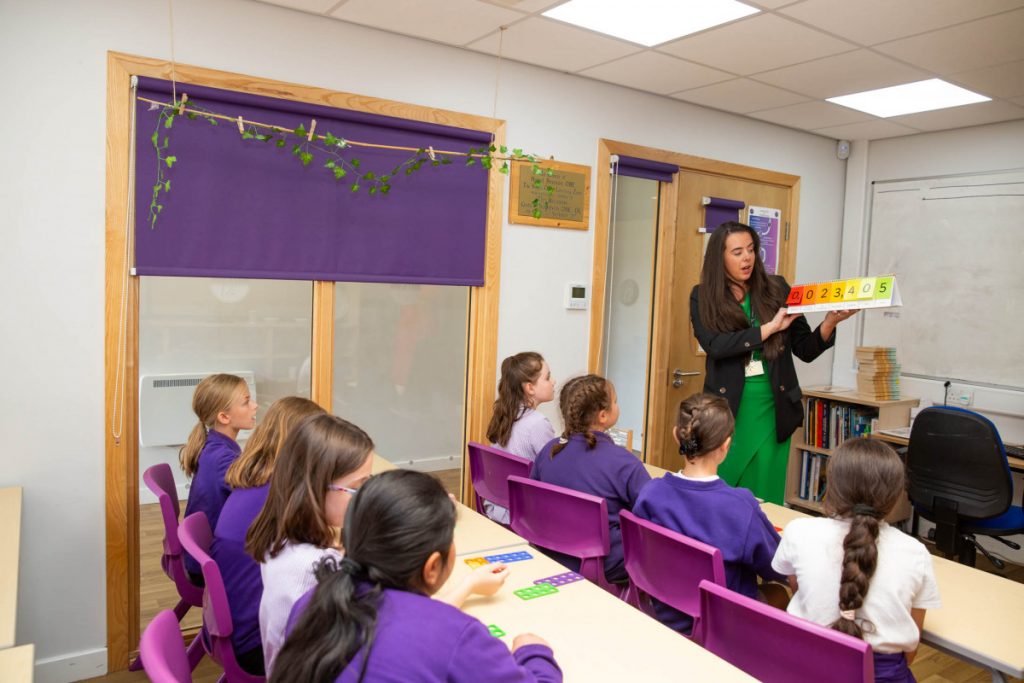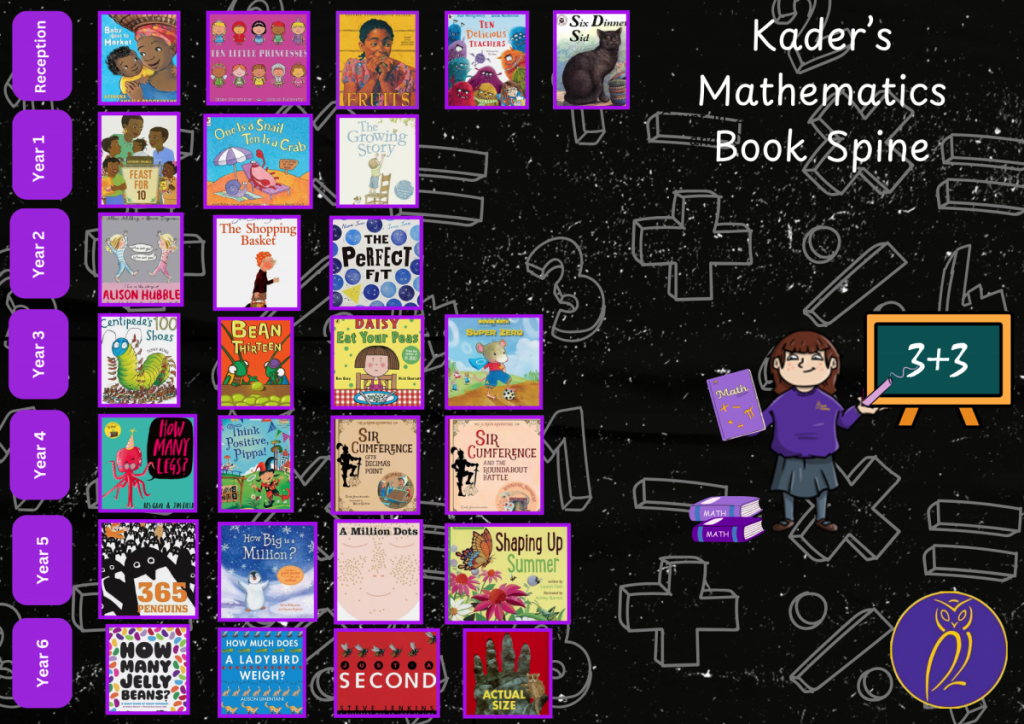Mathematics Lead : Mrs V. Emms
“At Kader Academy, we believe in ‘keep up, not catch up’ – ensuring every child builds strong mathematical foundations from the start so no one is left behind.”

Aims
At Kader Academy, we view Maths as an exciting adventure with each child at the center of their learning. The culture around mathematics is built on the belief that every child can achieve success, regardless of their starting point, with the right support and mindset. Our aim is to help children not only learn but also remember and apply their knowledge. Our creative lessons follow a mastery approach and our aim is to provide the children with as many opportunities to explore and engage with mathematical concepts as possible. We aim to develop fluency in the fundamentals of Maths through varied practice, quick recall and allowing opportunities for building a deep understanding of the subject. We aim that by mastering key skills early, our children are equipped to handle real-life situations, from managing money to interpreting data. We believe a strong foundation in Maths opens doors to future academic success and diverse career paths, whether in technology, finance, engineering or retail. Our aim is that children feel confident in Maths- empowering them to navigate challenges in their daily lives and future learning stages.
Approach
At Kader, we are committed to providing all of our students with a deep understanding of mathematics through an inclusive approach known as ‘Teaching for Mastery.’ We are an accredited NCETM (National Centre of Excellence for Teaching Mathematics) Sustaining Mastery School and our maths curriculum is underpinned by the ‘Five Big Ideas’ that are at the heart of this approach. These ideas help guide our teaching, ensuring that our students develop a solid foundation in mathematics that they can build on year after year. Staff use the Kader Maths Handbook document that maps out the progression from EYFS – Year 6.
As part of our approach, we recognise that in order for children to master a skill (especially in maths) they need to be able to explain and justify their understanding lots of times so that they can remember more and do more. An explicit opportunity for children to revisit learning is in the DART (Dedicated Active Recall Time) session which happens at the start of every maths lesson and can last anywhere between 5-20 minutes.
Oracy is at the heart of every subject, and, for maths, ‘Talk Time’ is utilised in all lessons across school and plays an important part in our children’s success. Alongside speaking and listening, we also recognise the power of storytelling in maths and each year group utilises a range of selected texts that support the teaching of key maths concepts. This approach allows the children to explore maths in the safety of a story – ultimately raising participation and confidence in mathematical reasoning and problem solving skills.
Staff use a range of high-quality resources throughout school and our consistent approach with concrete, visual and abstract resources allows the children to build on prior learning year-on-year. Staff use a lesson format of ‘I do. We do. You do.’ This ping-pong effect allows students to gradually take ownership of their learning: first observing the teacher; then working together and finally, applying their understanding independently with confidence. This inclusive approach to maths is what makes it accessible to all children, ensuring every student has the support they need to succeed.
Throughout Years 1-6 children are assessed on the National Curriculum objectives, staff use a system known as triple tracking. This ensures children are assessed correctly. This involves: reviewing children’s book work, teacher observations alongside low-stakes tests. This approach ensures that the teachers gain a holistic view of each child – understanding that one hat and one approach does not fit all.
In addition to daily maths lessons, KS1 children engage in a daily 15-minute Mastering Number session (NCETM), focused on developing their subitising skills and deepening their understanding of number patterns. Similarly, Years 4 and 5 participate in a daily 15-minute Mastering Multiplication session, which supports their fluency in multiplication facts. We understand that mastering these key mathematical facts is crucial, as they lay the foundation for future success in mathematics and help students develop the confidence to tackle more complex concepts.
In our EYFS setting, we take a tailored approach to delivering a mastery maths curriculum that encourages all children to develop a deep understanding of mathematical concepts. We focus on building a solid foundation through concrete, visual and abstract representations, allowing children to explore mathematical ideas in a hands-on, engaging way.
Subitising plays a key role in this process, as it helps children quickly recognise quantities without counting, supporting their understanding of number patterns and laying the groundwork for more advanced mathematical thinking. By using a consistent approach and providing opportunities for guided practice, we ensure that every child progresses at their own pace, mastering key skills before moving on to more complex concepts. This approach helps children build confidence and fosters a love for learning maths from the very beginning.
Outcomes
Driven by our ambitious aims and approach, outcomes at Kader show that our children leave with confidence in their mathematical knowledge. Our maths inclusion Model empowers every learner to develop deep, conceptual understanding, fluency and reasoning skills, equipping them to tackle complex problems with resilience. Through our carefully structured Mastery approach, every child is supported and challenged- ensuring they make strong progress and reach their full potential. At Kader, we pave the way for success, fostering a love for mathematics that stays with our pupils far beyond their primary years. Statutory SATs results have been above the national average for over 10 years, demonstrating our long-standing commitment to excellence in this subject. The 2024 SATs outcomes were exceptional, with Kader ranked in the top 5% of schools nationally for the Greater Depth Standard; a reflection of our high expectations, quality-first teaching and rigorous curriculum. Many of our students move on to secondary school with a solid foundation of number sense and an open mind to mathematics. Their secondary trajectory for GCSEs is ambitious, with high expectations set early due to their positive connection with maths at Kader. Our pupils don’t just meet expectations, they run their own race, making progress at their own pace and achieving their full potential. Every child leaves Kader prepared for their next stage of learning, equipped with confidence, resilience and a deep understanding of mathematics.
Below you will find an overview of ‘endpoints’ for each year group. These endpoints have been carefully considered and chosen- identifying key maths concepts and knowledge that your child will need a good level of understanding of, in order to progress to the next year group.

Our Mathematics Book Spine brings maths to life through engaging stories, helping children develop reasoning, problem-solving and oracy skills in a meaningful way. Using storytelling as a bridge to trickier concepts, we create a safe and exciting space for all learners-including those with maths anxiety – to explore and enjoy mathematics. These carefully selected books align with year group objectives, fostering deep mathematical thinking and discussion. 💡✨
A guide for parents and carers
For many years, parents have found themselves visiting school with their children only to hear themselves saying, “It’s not like when I was at school,” and “That’s not how we were taught.”
Maths remains very important and, together with English and Science, is considered a core subject in both primary and secondary education. The National Curriculum (National curriculum in England: mathematics programmes of study – GOV.UK (www.gov.uk) sets out in some detail what must be taught in each of these subjects and they will take up a substantial part of your child’s learning week. Much of the publicity about the changes to the curriculum (which changed in 2014) has focussed on ‘higher expectations’ in various subjects and it is certainly the case that in some areas the content of the primary mathematics curriculum is significantly more demanding than in the past. For example, there is now much greater focus on the skills of arithmetic and also on working with fractions.
In September 2021, The EYFS (Early Years Foundation Stage – AKA Nursery and Reception) progression of skills document (Development Matters Statutory framework for the early years foundation stage (publishing.service.gov.uk) was altered so children had a heavier focus on basic number skills due to the impact of the Pandemic.
FAQS
My child is really good at maths. What will school do to develop my child’s mathematical skills?
If your child is achieving well, rather than moving on to the following year group’s work, we will encourage more in-depth and investigative tasks. Mastering maths means pupils acquiring a deep, long-term, secure and adaptable understanding of the subject and at Kader, we believe this is achievable for all. For more information, please speak to your child’s class teacher.
My child struggles with maths. What will school do to develop my child’s mathematical skills?
We support all children in developing their mathematical skills through high-quality teaching, practical resources and targeted support where needed. We also use storytelling and problem-solving to build confidence and make maths enjoyable. For more details on our approach, ask your child’s class teacher.
What homework do the children get for maths?
Children can access a range of platforms to support them with their home learning. Mymaths, TTRS, Numbots are our main digital platforms for homework. You can ask your child’s class teacher for more information on this.
Want to know more about Mastery Maths?
Click here A video overview on teaching for mastery at primary | NCETM to listen to Debbie Morgan – Director of Primary Mathematics for the NCETM
What Tests will my child take?
Like many schools, Kader Academy use tests (PiXL) at all stages of a pupil’s education. For the most part, these are part of a normal classroom routine and support teachers’ assessment. However, at certain stages of a child’s schooling there are also National Statutory tests which must be taken by all children in state schools. Often informally known as ‘SATs’, the National Curriculum Tests are compulsory for children at the end of Year 6. Children in this year group will undertake tests in Mathematics, alongside those in Reading and Grammar, Punctuation & Spelling. In Y2, Non Statutory End-of-Key Stage 1 tests are also completed. In Y2, the class teachers mark the tests and they use the results to inform their own assessments, however, in Y6, the tests will be sent away for marking and results are reported to schools and parents in Summer term.
At Kader Academy, we also use a PiXL data tracking system to measure progress in the intervening years. Schools will then provide accompanying information to parents to explain how children are progressing – it makes attending parents evening meetings each Autumn and Spring even more important.
Year 4 Multiplication Tables Check
The purpose of the check is to determine whether your child can fluently recall their times tables up to 12×12, which is essential for future success in mathematics and also the national expectation for children this age. It will also help your child’s teacher to identify if your child may need additional support. For further information about how, when and why the test will be administered, please click here. Multiplication tables check: information for parents – GOV.UK
